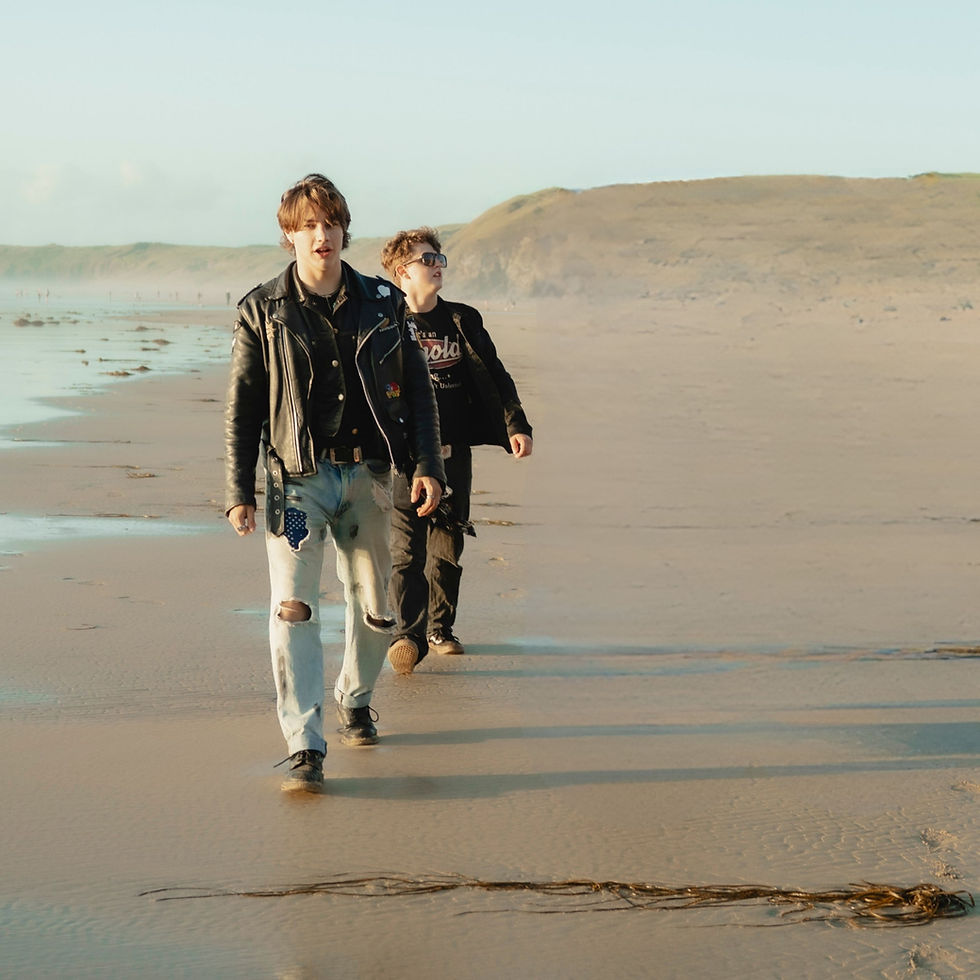Interview - The Lower Aetna
- Alice Smith
- Aug 14, 2024
- 5 min read

Thank you for sitting down and talking to FLEX. Can you tell us a bit about how you got into music?
I’ve always loved music. But in my early twenties in particular, I realized that I needed creative outlets—that simply working, sleeping, eating, doing errands, and getting drunk on the weekends would drive me completely insane if I didn’t find a way to express myself. That’s when I started to think about myself as someone who makes art rather than someone who (only) consumes and appreciates it. It’s helped keep my head on straight ever since.
Who would you say are your biggest musical influences?
I spent most of my teens marinating in The Killers, The Gaslight Anthem, and ‘70s Sprinstreen. Bruce is easily my biggest influence. I grew up in New Jersey and found my way to his music in high school, so I have my biases. But In my opinion, he’s the best to ever do it.
So that's what's in my musical DNA. It’ll always be there. But as I’ve gotten older, I’ve also gravitated to songwriters and storytellers like Jason Isbell and Willy Vlautin. I love songs about characters who feel real. I think those guys are total masters of the craft.
Congratulations on your brand-new song 'Blood Moon' - what inspired this particular track?
“Blood Moon” is the third and final single from our new record, Pine, which is streaming everywhere now. The song is about a gay farmhand living a quiet life, working in a rural community, who finally has a chance at a human connection.
I worked on a farm for half a year or so when I was younger and I loved it. I was maybe three years or so from coming out of the closet, and “Blood Moon” is sort of a mashup of those ideas. What’s it like to come out later in life, while still living in the same small town where you’ve always lived, doing the same things you've always done? Your whole inner world changes, but the world around doesn't change a bit. How does that feel? What kind of person might that turn you into? The character in “Blood Moon” is an exploration of all that.
How do you channel personal experiences into your songwriting, and what do you hope listeners gain from connecting with your music?
None of my songs are 1:1 reflections of my own life experience. I admire the hell out of “confessional” songwriters who can write directly from their own perspective with ease, but I am not one of them. I need to use fiction to create some separation.
That said, everything I write is certainly inspired by real people I know or real experiences I’ve had. Heightening those real experiences to fiction gives me the creative license to fill in all the details on my own, so that I can try to express whatever it is I want to express. On Pine, the song “20k Kings” is about a bunch of South Jersey dudes in their early twenties who make no money, but live and die for summer weekends partying in Atlantic City. I’ve never been one of those guys, but I know who those guys are. Zeroing in and writing about them for a bit lets me say something about friendship, or masculinity, or growing older from a different perspective.
Each aspect of music – writing, recording, practising, and playing live – offers something different. Can you share a particularly meaningful moment from each?
For me, writing is like looking for a flashlight in the attic. At first, I’m just casting around in the dark, hoping my hand will land on the thing I’m looking for. And eventually it does, and the light turns on, and that’s why I feel ready to commit to an idea for a record. That aha moment is so exciting. I’ll write fifteen songs worth of garbage…but if the sixteenth song feels right, it’s like finding that flashlight. It’s the best.
Recording is a different beast entirely. Rich Straub and I co-produced Pine together, and we basically made the record over the course of a year in our living rooms and basements. If you’re willing to spend some money on gear and to run the risk of annoying your neighbors by playing the same guitar parts over and over, you can pretty much make an entire record by yourself. We just did it and it was a blast.
In its current lineup, The Lower Aetna is an eight-piece band. I’m really excited about that. It’s rare to find that many people who all get along, are genuinely good people, and are extremely skilled players. It’s a little like catching lightning in a bottle. Most of the rehearsal is spent just making tweaks here and there so that we’re all on the same page, especially for moments that depart from the studio recordings. And playing the songs live is a joy. It’s the most fun I’ve had as a musician.
Is there a song in your repertoire that holds a particularly deep personal meaning for you? Can you share the story or inspiration behind it?
“Getting Older” is the first song on Pine, and it was the first song I wrote for Pine, too. It was the “flashlight” song for this record; I was just fumbling around in the dark until I wrote it. Once it was done, I was able to say, “Okay, yeah. There’s an idea here. Let’s explore this.”
“Getting Older” isn’t about me, but it’s got pieces of me in it, as well as pieces of a few of my friends. It just felt good to tell that story. There are so many songs about being young, going through change, etc…but what about those long stretches where we’re just going through the motions, wondering “Man, is this it?” I think that happens to a lot of folks in their mid-to-late 20s, but it could happen to all of us at any point, really. I thought it was a story worth telling and a good way to introduce the record.
If I were to point you to a song from our first record, Waiting For God To Turn On The Lights, I’d have to pick “Patriots.” It’s a sarcastic monster truck rally of a song, and I will love it forever.
What are your goals for the future with your music?
I think we just want to keep going, and go further. Making Pine both felt like a beginning to what The Lower Aetna can really be, and a validation of the big swing-approach we took on Waiting For God To Turn On The Lights. I don’t want to just record and release music for its own sake. I want to grapple with big, uncomfortable ideas and write about complicated, problematic, broken characters. I think we did it well on Waiting For God, but I think we really cracked it on Pine, and it feels like the sky’s the limit from here.
What message or feeling do you hope listeners take away from your music?
It’s fine to be a complete mess. Every character on Pine is lost in some way. They’re in the grips of a deep loneliness, or they desperately need something they’ve never had and don’t know how to get. They’re good people and they’re trying their best. But they’re struggling, and there are emotional consequences to that struggle.
I basically think that’s the case for all of us, though it may look different. Leonard Cohen said it best: “There’s a crack in everything, that’s how the light gets in.” We all have cracks. We try anyway. That’s not a problem, that’s the point.
To wrap things up, is there anything else you'd like to share with our readers?
If someone does or makes something that resonates with you, tell them. Even if they’re a stranger. We all deserve to feel less lonely than we do. In reality, we’re all less alone than we feel. Just reaching out to say, “Hey, thanks for that, it meant something to me” can build community in and of itself. It goes a lot further than you might think.




Comments